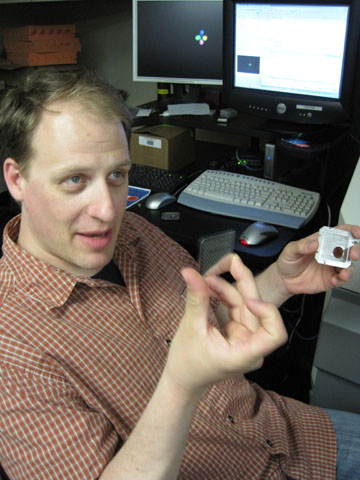
Education:
Josh went to college at Western Washington University for his undergraduate work. He entered thinking he would be a computer science major, but changed his course of study after taking a biology course and a chemistry course that he really enjoyed. He felt that was totally normal though seeing as most people change their major one to two times before they graduate. What really interested Josh in science were the “miracles” that could happen through research; for example, the discovery of Lipitor by random chance or the fact that the smallest chemicals can have the biggest change in the behavior of a population.
Some little tidbits of advice Josh gave us were that he thinks first year classes are just to weed out kids, but if you like a first year class then you should definitely take a second year course of that subject. That was case with Josh and his first year chemistry class which actually led him to change his major. As an afterthought, Josh wishes he had studied harder in high school, but learned that college is not about where you go, but what you do with it. He also feels that you need to just keep working hard no matter where you are early in life. Also, from his personal experience, he thought that interning or even just volunteering in a lab can be very beneficial.
Josh went on to get his PhD from the University of Washington.
Accelerator Corporation:
Accelerator Corporation is a biotech venture capital firm, a group that gives money to new, high-potential companies so they can grow. The firms normally get their money from state-run pension programs, but they are extremely cautious because it’s very expensive and risky to start new bio tech companies and nearly 80% of biotech companies fail.
Accelerator runs a little differently from the typical venture-capital group; they act as a platform start-up company, taking away the extra costs of starting a company by supplying them with management services and a lab facility needed when starting a new biotech company. By doing so, they reduce the risk and expense associated with starting a new biotech company and in the long run they’ve been more successful in starting companies, getting 1 to 2 companies on their way yearly.
Another way Accelerator ensures less risk and expense is by setting milestones that the company must meet in order to continue receiving funding. In the last several years, Accelerator has started 10 companies, of which 5 have failed, 2 are in the works, and 3 have brought in over $15 million.
Josh’s role in Accelerator was as a liaison between a potential company, a spin-off of a professor’s work at Caltech, and Accelerator. He worked with a team to assess the profitability of that potential company. They decided it would be a good risk to take, but unfortunately, the company didn’t meet its milestones and was ended by Accelerator.
The business side of science is something that really interests Josh. From his standpoint as one who analyzes different companies, he is intrigued by seeing what makes a company succeed and what makes a company fail.
ISB:
Josh came to ISB after he received his PhD from UW. His favorite part about working here is how many smart people from every sort of discipline you can find here. It’s really the opposite atmosphere of a university, he says. You can actually meet the people here and have a conversation with them, and you’ll get real explanations, not just a dull lecture. |



